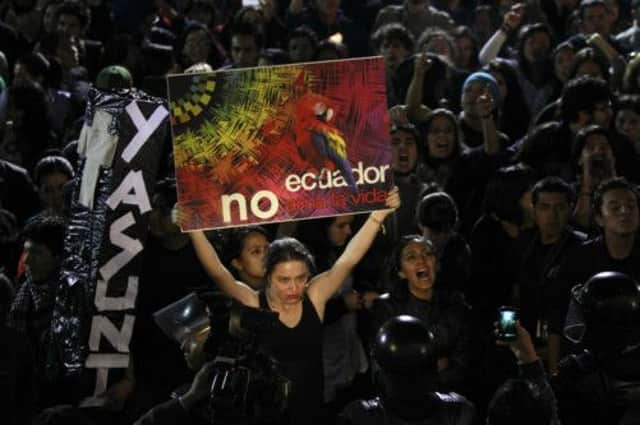Anger as Ecuador president opens Amazon to oil firms


Environmentalists had welcomed the initiative when Mr Correa first proposed it in 2007, saying he was setting a precedent in the fight against global warming by lowering the high cost to poor countries of preserving the environment.
In a nationally televised speech, he said: “The world has failed us.
Advertisement
Hide AdAdvertisement
Hide Ad“I have signed the executive decree for the liquidation of the Yasuni-ITT trust fund and through it, ended the initiative.”
ITT refers to three untapped oil blocks known collectively as Ishpingo-Tambococha-Tiputini.
Scores of protesters gathered in front of the presidential palace shortly after the announcement, angered by the decision, while others opposing them, waved flags in the colour of Mr Correa’s political movement.
Mr Correa said the global recession was in part responsible but chiefly blamed “the great hypocrisy” of nations who emit most of the world’s greenhouse gases.
“It was not charity that we sought from the international community, but co-responsibility in the face of climate change,” he claimed
Mr Correa had sought £2.3 billion in contributions to maintain a moratorium on drilling in the Yasuni National Park. It was declared a biosphere reserve by the United Nations in 1989 and is home to two Indian tribes.
But he said Ecuador had raised just £8.3 million in pledges and that he had an obligation to the people of Ecuador, particularly the poor, to move ahead with drilling. The UN and private donors had put up the cash, it was said.
Mr Correa, a US-trained economist, said he was proposing oil exploration in Yasuni amounting to less than 1 per cent of its 3,800 square miles to the National Assembly, which his supporters control,
Advertisement
Hide AdAdvertisement
Hide AdHis no-drilling plan had envisioned rich countries paying Ecuador half the £4.6bn in revenues expected to be generated over ten years from the 846 million barrels of crude estimated to be in Yasuni. Not drilling in the reserve would keep 410m tonnes of carbon dioxide from entering the atmosphere, officials had said during their global lobbying campaign that included organising tours of the reserve for journalists.
But while Mr Correa’s proposal generated interest, there were few takers, in part because he insisted Ecuador would decide how donations would be spent. European countries expressed most interest but still balked.
Ecuador is an Opec member that depends on oil for a third of its budget. The three oil fields in Yasuni represent 20 per cent of its oil reserves.
Political analyst Jose Fuentes, of Flacso university in Quito, said Mr Correa had opted “for economic pragmatism” in abandoning the environmentalist image he had wished to project internationally.
Matt Finer, a scientist at the US-based Centre for International Environmental Law, said: “It is deeply disappointing this alternative model for dealing with oil and gas reserves in mega diverse rainforests did not work.
“The Yasuni-ITT Initiative was the lone exception to the relentless expansion of hydrocarbon projects deeper into the most remote tracts of the western Amazon. Now there is really no viable alternative to stop the wave of drilling slated for the most biodiverse region of the world.”
Biologist Adrian Soria, 38, one of the protesters outside the presidential palace, said Yasuni ’s ecological worth was far greater than that of any oil it could offer.
“Yasuni is important for humanity and as Ecuadorians, we can make the difference … Yasuni must be preserved and that is more important than the oil,” he said. Correa played down the impact of oil drilling in the area, saying it would affect only 0.01 per cent of the Yasuni basin.